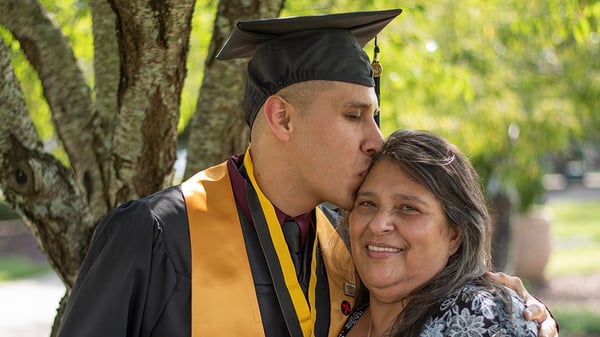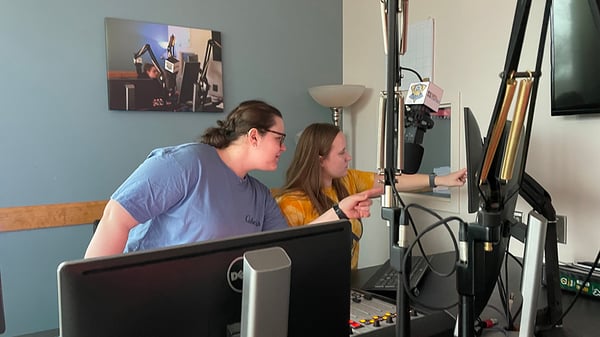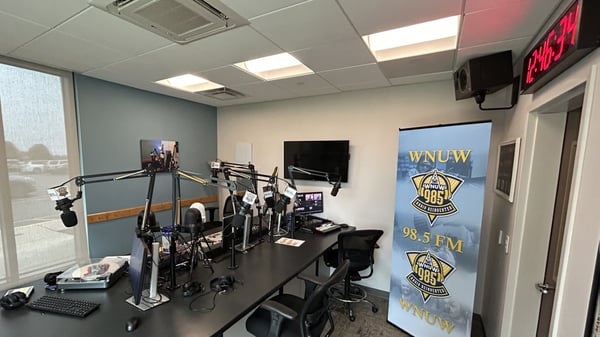Hispanic Heritage Month was celebrated from September to 15 to October 15, and across the region...
No More Rides to the RAB; Environmental Benefit Unclear
.jpg)
The RAB shuttle bus, previously used to drive students and faculty to and from the Rocco Abessinio Building has been canceled this year.
In the beginning of the school year, many returning students and faculty members noticed a small but rather impactful change that was made. The shuttles that once transferred students and faculty up and down the hill from the Bachmann Building to the Rocco Abessinio Building throughout the day were no longer running.
“The decision was not a campus safety decision but an administrative decision to reduce the carbon footprint and cut down cost. The decision was part of a bigger plan to start using different vehicles on campus,” said Leon Francis, director of campus safety.
CFO and Vice President for Administration Bruce Cairnduff reported that the cancellation of the shuttle bus to the RAB was done in an effort for Neumann to become more environmentally friendly.
Furthermore, the introduction of alternative modes of transportation on campus in the near future is possible. Instead of having shuttles being driven around campus, the administration is considering using Gator golf cars, which are larger than typical golf carts and more energy efficient.
“Throughout the summer we carried out an extensive examination of our resources to identify opportunities for Neumann to be a more environmentally aware campus – including campus transport and facilities. Eliminating the RAB shuttle is one of several opportunities we identified to help us towards these environmental goals. It is also in line with other key goals, such as the most effective stewardship of university resources,” stated Cairnduff.
Although this service has been discontinued, students with disabilities who make this difficult commute are still able to call campus safety to request rides to the RAB if needed. However, other students and faculty working in the RAB who do not drive will continue to have to take this walk, which many have mixed opinions about.
“It takes me three minutes to walk up or back down, so it is not a lot of time and I have lost over 25 pounds and close my exercise rings daily. But with that being said, I miss being lazy and taking the shuttle, but at this time I would still walk cause it’s not that bad,” said professor and student advisor Dr. Robert Kennedy. Likewise, Cairnduff says that although he drives, he enjoys taking the walk to clear his head.
Comments by students who take this walk throughout the week for classes indicate that most students miss the shuttle bus being in operation but are understanding of the reasoning behind ending this service.
Although most people interviewed about this change were approving of the reasoning behind this change, concerns about whether getting rid of the shuttle is actually beneficial to the environment were raised by another faculty member.
Dr. Etsuko Hoshino-Browne, psychology professor and co-chair of the Sustainability Advisory Council, first expressed support for the logic behind this decision. “The idling of the shuttle bus’s engine while it was waiting for passengers was especially disturbing to those who have been making efforts toward sustainability in our NU community. By canceling the shuttle bus service, NU is making a major contribution in reducing greenhouse gas emissions which is one of the major causes of climate change we are experiencing today,” she stated.
Dr. Hoshino-Browne also mentioned the downside of this decision, which is its inconvenience to students and the possibility that it may cause more students to individually drive back and forth from buildings on campus.
“In bad weather, not many students want to walk up or down the hill. I understand these inconveniences. In the absence of the shuttle bus service, some students may want to drive from their dorms to the RAB for a class, drive back to the Bachmann Building for another class, and then drive back to their dorms. But such driving on campus not only offsets positive outcomes of the cancellation of shuttle bus, but it also increases more greenhouse gas emissions.” she stated.
Ultimately, the decision to cancel the shuttle bus has generated varied opinions by faculty and students about its pros and cons. It is difficult to make changes to protect the environment when those decisions result in changes to people’s daily routines and habits, even more so when the changes are inconvenient, which can cause negative opinions and backlash. However, the acknowledgement of the way we affect our environment and contribute to its harm by certain practices is useful.




